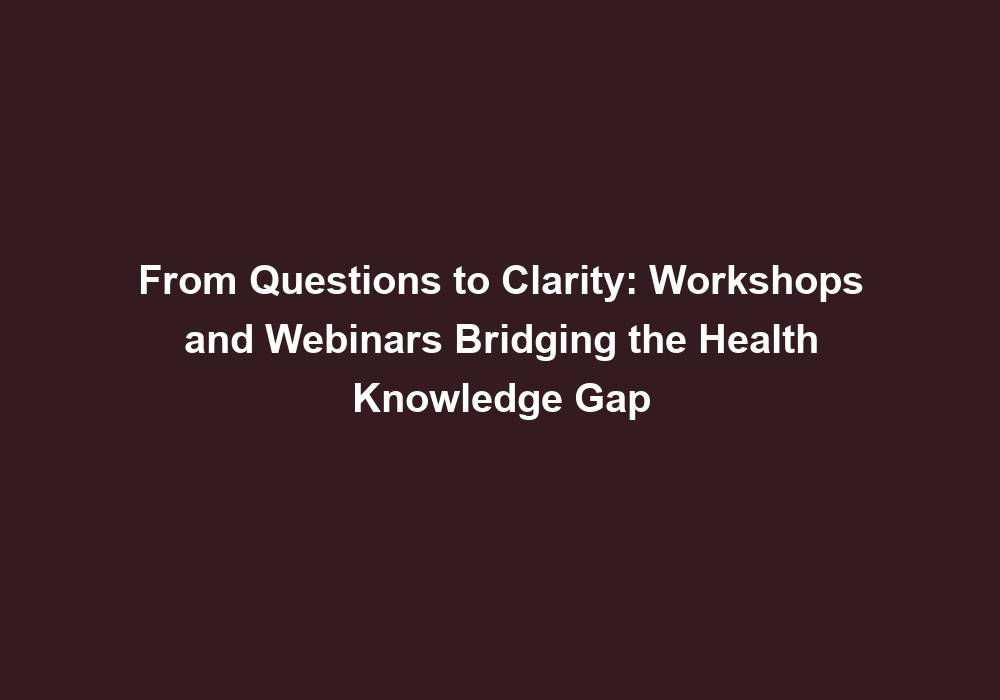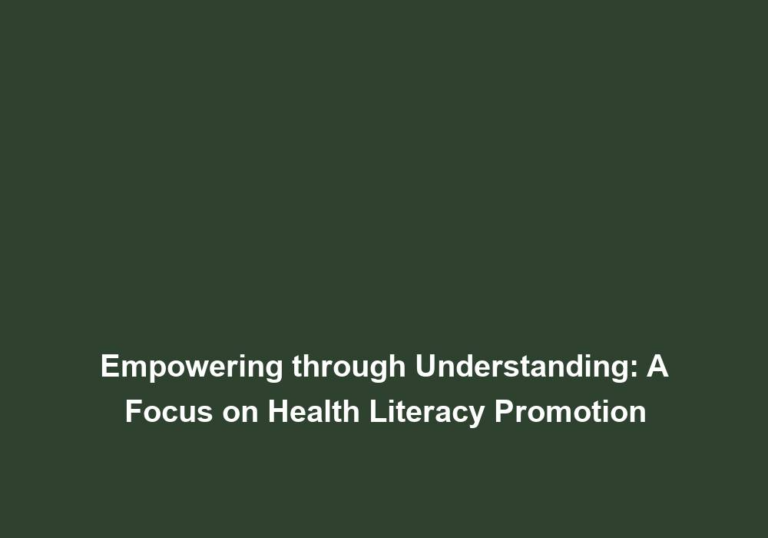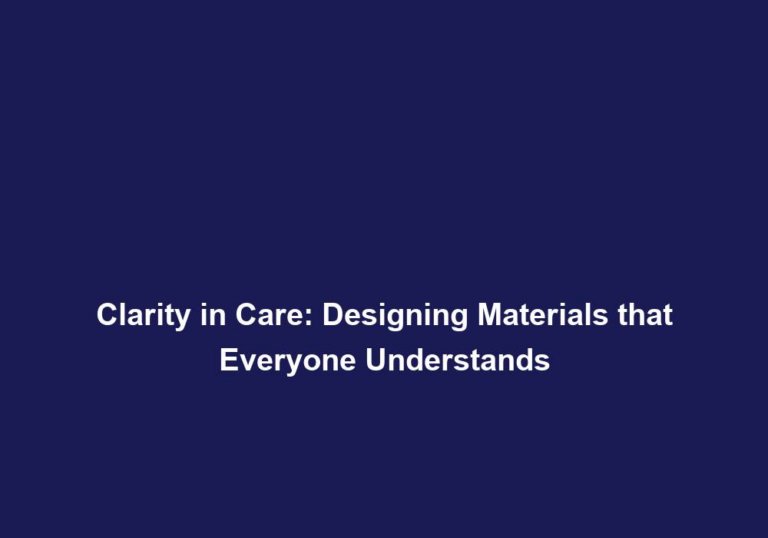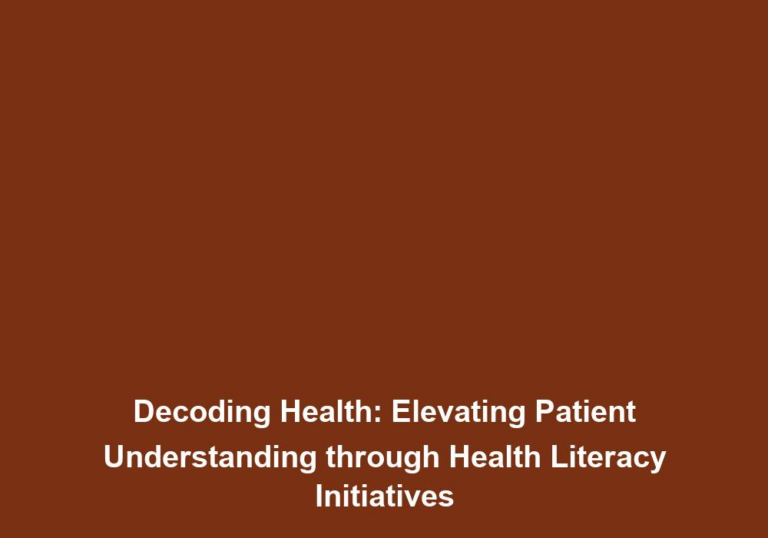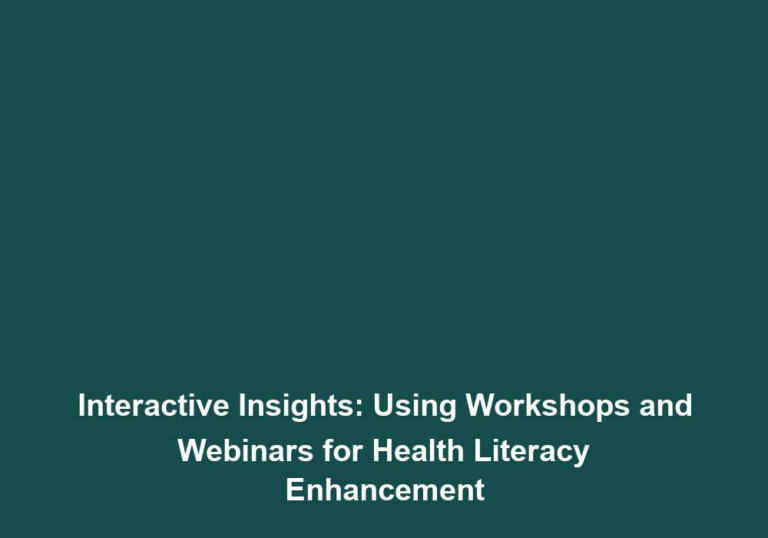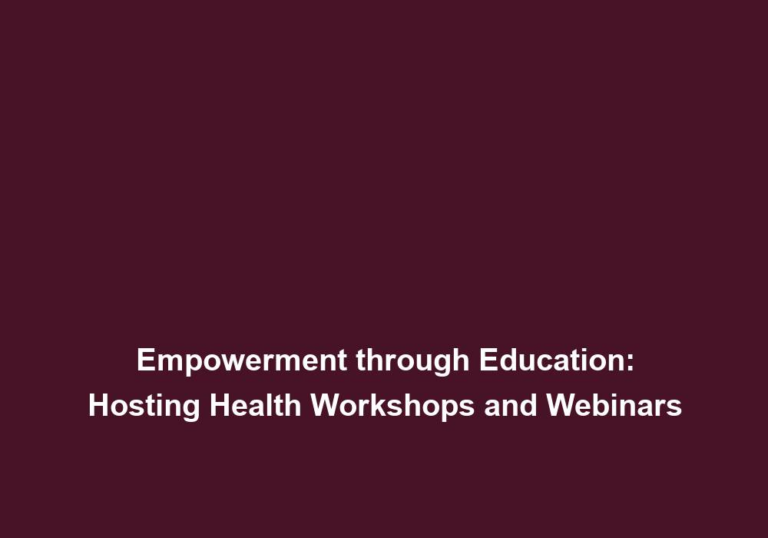From Questions to Clarity: Workshops and Webinars Bridging the Health Knowledge Gap
In today’s fast-paced world, staying updated with the latest health information and research can be a challenging task. With the abundance of information available online, it becomes essential to have reliable sources that bridge the gap between questions and clarity. Workshops and webinars have emerged as powerful tools for disseminating knowledge and empowering individuals to make informed decisions about their health.
The Importance of Health Knowledge
Health knowledge plays a crucial role in our lives. It enables us to understand our bodies better, make informed decisions about our well-being, and take necessary actions to maintain good health. Lack of knowledge in this domain can lead to misconceptions, ineffective treatments, and even serious health risks.
Expanding on this paragraph, having a solid understanding of health-related topics empowers individuals to take charge of their own well-being. It allows them to recognize the importance of preventive measures such as regular exercise, balanced nutrition, and routine health screenings. Without adequate knowledge, individuals may overlook crucial aspects of their health, leading to potential complications in the long run.
Challenges in Accessing Health Information
Despite the vast amount of health information available today, accessing accurate and reliable knowledge can be a challenge. Some common challenges include:
-
Information Overload: The internet is flooded with health-related content, making it overwhelming for individuals to filter through the noise and identify credible sources.
-
Misleading Information: Not all sources of health information are trustworthy. Many websites and blogs disseminate misleading or false information, causing confusion among readers.
-
Complexity: Health-related topics can be complex and often require professional expertise to understand. Laypeople may struggle to grasp scientific jargon and interpret research findings.
-
Time Constraints: People lead busy lives and may not have the time to extensively research and educate themselves on various health topics.
To further elaborate on these challenges, the internet has become a breeding ground for misinformation. Individuals searching for health information often encounter contradictory advice, making it difficult to discern the truth. Additionally, the complexity of medical terminology and research can be overwhelming for those without a medical background. It is essential to bridge this gap between scientific knowledge and the general public, ensuring that accurate and easily understandable information is readily available.
Bridging the Gap with Workshops and Webinars
Workshops and webinars have gained popularity as effective platforms for bridging the health knowledge gap. These interactive sessions provide a structured approach to disseminating information, addressing common queries, and empowering individuals to take charge of their health. Here are some key benefits associated with workshops and webinars:
1. Interactive Learning Experience
Workshops and webinars offer a dynamic learning experience that engages participants actively. Unlike passive reading or watching videos, these platforms encourage participants to ask questions, seek clarifications, and engage in discussions. This interactive approach enhances retention and deepens understanding.
By actively participating in workshops and webinars, individuals can interact with experts and fellow participants, gaining valuable insights and perspectives. This engagement provides a more immersive learning experience, enabling participants to grasp complex concepts more effectively.
2. Access to Expertise
By attending workshops and webinars, individuals gain access to subject-matter experts who can provide accurate and reliable information. These experts possess in-depth knowledge and experience in their respective fields, allowing participants to learn from the best and clarify any doubts they may have.
The expertise provided by these professionals ensures that participants receive up-to-date and evidence-based information. This is particularly important in the ever-evolving field of healthcare, where new discoveries and advancements are constantly being made. Having access to experts ensures that individuals stay well-informed and can make informed decisions about their health.
3. Tailored Content
Workshops and webinars are designed to cater to specific topics or target audiences. This enables participants to focus on areas of interest or concern, ensuring that the content is relevant and personalized. Such tailored content enhances the learning experience and helps individuals address their unique health concerns.
Participants can choose workshops and webinars that align with their specific interests or health goals. Whether it’s managing chronic conditions, understanding nutrition, or exploring alternative therapies, there is a wide range of topics available. This customization ensures that individuals receive information that directly addresses their needs, leading to a more meaningful and impactful learning experience.
4. Practical Tips and Strategies
One of the significant advantages of workshops and webinars is the practical advice and strategies shared by experts. These sessions often include actionable tips and recommendations that participants can implement in their daily lives. By learning practical strategies, individuals can effectively translate knowledge into action and make positive changes in their health habits.
Participants can gain valuable insights into lifestyle modifications, self-care practices, and preventive measures that can improve their overall well-being. These practical tips empower individuals to take control of their health and make informed choices that positively impact their lives.
5. Networking and Peer Learning
Workshops and webinars provide excellent opportunities for networking and peer learning. Participants can engage with like-minded individuals, share experiences, and learn from each other’s perspectives. This sense of community fosters a supportive environment, where individuals can seek guidance and motivation from their peers.
The networking aspect of workshops and webinars allows participants to connect with others who may be facing similar health challenges or seeking similar information. This interaction not only expands their knowledge but also provides a support system where individuals can find encouragement and solidarity in their health journeys.
6. Flexibility and Convenience
Unlike traditional classroom-based learning, workshops and webinars offer flexibility and convenience. Participants can attend sessions from the comfort of their homes or offices, eliminating the need for travel and saving valuable time. Additionally, many workshops and webinars are recorded, allowing participants to access the content at their convenience and revisit it whenever needed.
The flexibility provided by workshops and webinars ensures that individuals can engage in learning without disrupting their daily routines. This accessibility is particularly beneficial for those with busy schedules or geographical constraints. Participants can choose the time and place that suits them best, making it easier to prioritize their health education.
Conclusion
In an era where health information is abundant yet fragmented, workshops and webinars emerge as powerful tools for bridging the health knowledge gap. These interactive platforms provide individuals with the opportunity to learn from experts, ask questions, and gain practical insights. By actively engaging in these sessions, individuals can transform their questions into clarity and take proactive steps towards better health.

